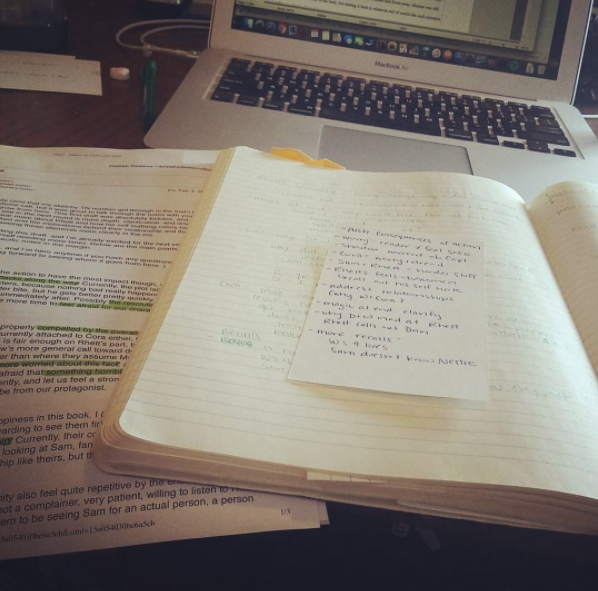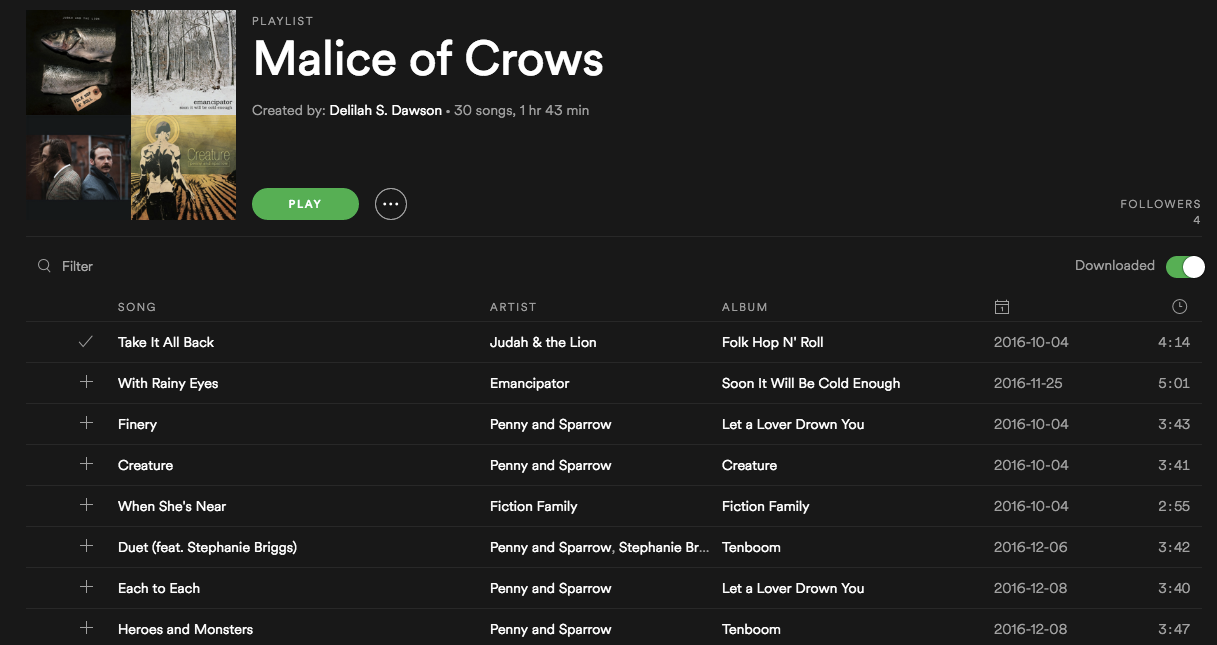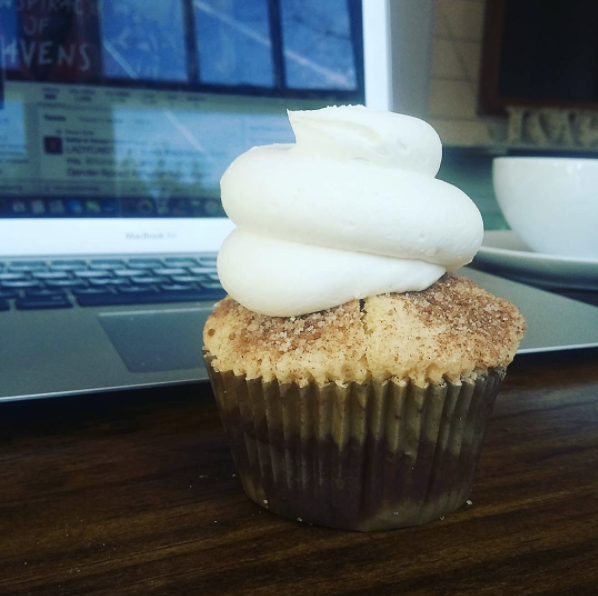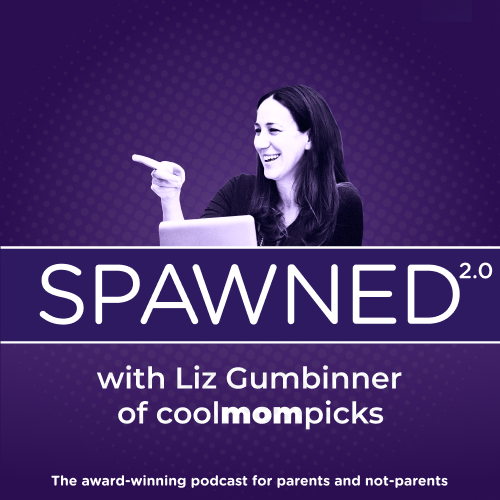I’ve got good news and bad news. The good news is that you can totally write a book. You don’t need otherworldly talent (though you do need some talent); you don’t need an MFA you promised yourself you’d get but never did; you don’t even need somebody else’s permission.
The bad news? Writing a book is really hard.
But, if you think you’ve got one in you, I can help.
I’m now a traditionally published author, but back in 2009, I was just a harried mom of two who needed a hobby just for me.
My husband (bless him) suggested I try writing a book, and I was so sleep deprived that I figured, why not? By 2010, I’d written two books and was lucky enough to sign with an agent. By 2012, I had a book published by Simon & Schuster on the shelves at Barnes & Noble.
Today, I have 8 books, 6 novellas, a comic, and tons of published short stories.
But when I sat down 8 years ago with just an idea — based on a dream! — I had never written anything longer than an English paper. If I had to go back and nudge the 2009 me toward the laptop all over again, here’s what I’d tell her.
CMP is an rstyle affiliate
Related: 10 things never to say to a working mom
1. Stop judging yourself.
The first time I tried to write a book, it didn’t get past the first paragraph because I couldn’t choose the heroine’s eye color. True story. Now, I know that first drafts are absolute crap.
Once you accept that your first draft will be garbage, you give yourself permission to write garbage. You can clean up garbage, but you can’t fix a blank page.
Read Stephen King’s On Writing if you think I’m exaggerating. Actually, read it anyway — it’s a game changer for writers.
2. Make writing a priority.
So many people at parties say, I wish I had time to write a book! to which I promptly (but as subtly as possible) roll my eyes.
If you’ve got time to watch reality TV or play games on your phone, you have time to write.
Wake up an hour earlier. Stay up an hour later. Take your laptop to work and eat your sandwich while you type. As for me, I take my laptop to my daughter’s soccer practice.
It also helps to let your partner know that this is important to you and engage their support. My husband used to take our two toddlers to the playground for an hour on the weekends so I could write, and I wrote an entire book that way.
Basically, if you keep waiting for the right time to write, you never will. So just do it.

3. Figure out your signposts before you start.
Trust me on this one: Writers who don’t know how their book will end often have trouble getting there.
Think of it like going on a trip and mapping out an itinerary: You need to know where you’re starting and where you’re heading, but you don’t need to know every detail along the way. You can make all sorts of stops in-between, some expected and some not.
I don’t start writing a book until I know where it starts and ends — the instigating factor that kicks off the plot, the main conflict, the climax. I also need to know who the main character and secondary characters are.
If you need help mapping it all out, some people use Post-Its, others keep a whiteboard at the ready for brainstorming, or make intricate inspiration boards. I’m old-school; I write it all down on index cards. Cheap, portable, easy.
Related: 5 BTDT tips for getting back to work after having kids
4. Do your own NaNoWriMo.
I’ve learned to write my first drafts very quickly, because, garbage. But also because it takes a lot of momentum to spit out so many words.
It’s normal to get bogged down reworking every paragraph, and, in doing so, it’s hard to get any traction. So just keep writing — no revising — and don’t look back.
Take a hint from NaNoWriMo, or National Novel Writing Month, which is a non-profit dedicated to helping writers connect and find support. They suggest you aim to write a 50,000 word first draft in a month. That’s 1,667 words each day for 30 straight days.
I know that may sound overwhelming, but you can do it! In fact, each year, thousands of writers sign up and get a dandy little badge if they hit their 50,000 word goal.
Go get yours!
It’s actually more doable than you might think. Even if you spread it out to two months, that’s 833 words per day. I bet you can hit that mark in an hou. Just keep typing and remember, don’t stop to rethink or revise. Those steps come later.

5. Make a playlist.
When I’m dreaming up a story idea, I make a Spotify playlist that sounds like how the idea feels. A Thriller soundtrack would be loud and thrashy. A Fantasy soundtrack would be sparkly and remind you of tiny elves and unicorns.
I listen to that playlist as I dream up the book, as I drive to the store, as I walk the trails. Then, whenever I hear the music, I’m in the book.
It’s a great way to condition yourself to get into writing mode after a tough day at work or with the kids or when you’re just not in the mood. It also helps your brain relax into that dreamy state that can help take you out of yourself and into your story plot. You’re basically hacking flow.
Whenever I get blocked, I put on my playlist and boom! The answer usually shows right up.
6. Save your work frequently.
The big lesson here is if you’re going to take the time to do the work, save the work!
Let me assure you: There is no pain like your 6-year-old spilling a glass of water on your laptop when you haven’t backed up the last 20 pages.
You can eventually replace that laptop (ugh, sorry, bank account), but you can’t replace those exact words.
Whether you use the Cloud, an external hard drive, or auto-save through a service like iCloud or Dropbox, make sure you do have a backing-up backup plan.
I actually email my existing draft to myself every 10 pages or so which works great for me.

7. Reward yourself.
Like I said, writing a book is hard, so you’ve got to plan rewards for yourself.
Hit page 10? Cupcake time!
Reached page 100? Tacos and margaritas!
Finished the first draft? Get a sitter and make reservations for the place that does that phenomenal roast quail, and be sure to order the champagne.
Writing a book can feel like a long slog, and you need to break it up and celebrate each milestone to keep yourself motivated.
And hey, if you need a big ol’ mocha or a big ol’ beer to loosen yourself up along the way, that’s normal. I needed half a bottle of wine to write my first sex scene. Ha.
8. Protect your art.
Especially when you’re writing your first book, you might feel very shy about telling people about your ideas. In fact, you should feel shy.
Think of writing like not telling anyone you’re pregnant until the second trimester; you need some space with this new venture.
The last thing you need are friends who judge you, your mother-in-law reminding you that failure makes you stronger, or pesky people who keep asking you how the book is coming along, which can mess up your flow, especially if it’s not going as expected.
Heck, I’ve got 8 published books on the shelf, and my closest relatives still ask me if I’m “still doing that little book thing.”
Besides, experts will tell you it’s also best for your writing not to share your ideas until they’re down on paper. You want that energy going into the writing, not the telling of the story to your friends and family.
So know it’s fine to keep that first book all to yourself, like a tender flower you’re growing from a seed, protecting it and nurturing it from the elements (or nosy family members!) so it can flourish.
Related: 10 simple ways to find more time in a busy day.
9. Read. A lot.
Some people stop reading as soon as they start writing, and that’s a huge mistake. You need to read widely, both in your genre and out of it.
Now I would say that perhaps you don’t want to read books that do the exact same thing you are, because you may end up feeling influenced in ways in which you don’t intend. But you can’t sell a middle grade book, a YA novel, a science fiction story, or a big romance without knowing what’s selling, what’s working, what’s out of fashion, and what the general reader of that genre expects.
Reading helps you absorb pacing, plotting, and character in ways that will benefit your own writing.
I’m always checking what’s available on BookBub, which has a great selection of e-books usually on sale for around $1.99 at Amazon, B&N, and iTunes. That includes best-sellers, too. And hey, we budding writers need to save money where we can.
10. Set goals, and figure out how to reach them.
Last but not least: Set a personal goal for yourself.
And I don’t mean “win a Newbery award.” Start with what you want to write.
Maybe you’re looking to write a memoir, self-publish poetry under a pseudonym, or pen a Harry Potter fanfic. That’s totally cool! There’s no obligation to pursue any traditional publishing route.
But if you do want pursue a novel or a biography, you should.
Now if one of your goals is to get traditionally published, it’s important to read up on that process so you know what you’re in for, and I can help there too.
For the full (albeit NSFW) rundown of how I did it, I recommend this article of mine that went pretty darned viral. It even includes how I found my literary agent online — via my couch in Atlanta while breastfeeding my son.
If you’re a new writer, also visit my list of great publishing resources which I’ve made available on my personal blog.
Keep in mind that there are lots of vanity publishers out there who will charge you crazy money to “publish” your book; but a better alternative may be to self- publish your book for free (really!) on Amazon with print copies published via CreateSpace.
See? Lots to read up on to help you stay smart and work toward your goals. But first things first…
Get writing.
You can do it!
Top photo: Juliette Leufke for Unsplash








